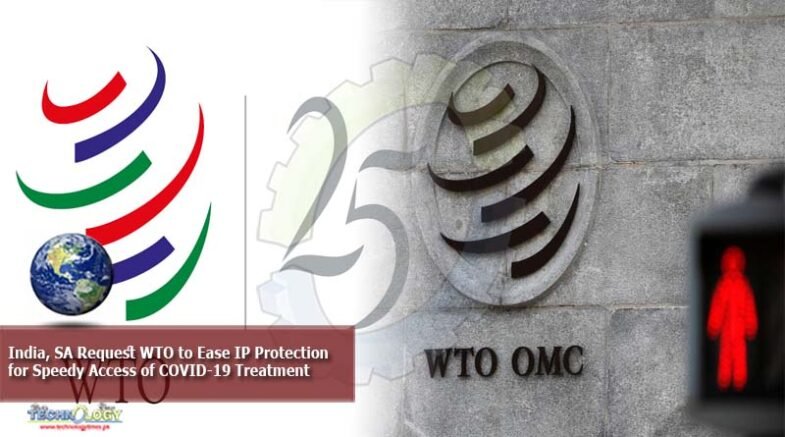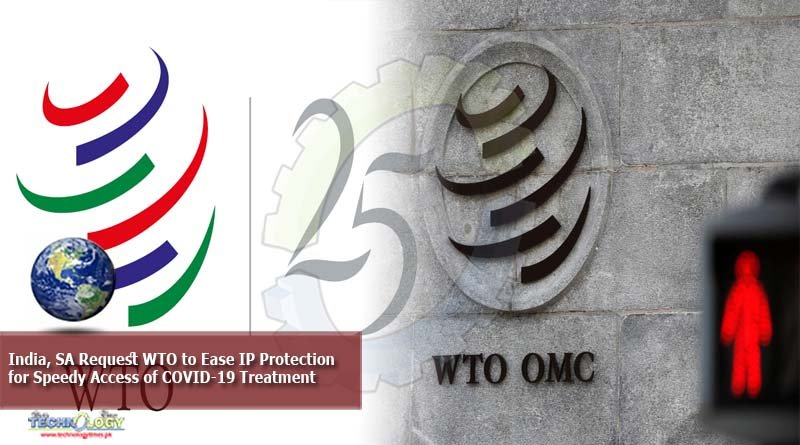The two countries argue that in the absence of a waiver, existing IP protection rights such as patents, industrial designs, copyright and protection of undisclosed information, may create barriers to timely access to affordable medical products.

India and South Africa have requested the World Trade Organization (WTO) to waive off certain key provisions under the Agreement on Trade Related Aspects of Intellectual Property Rights (TRIPS) to speed up the prevention, containment and treatment efforts against COVID-19 pandemic. The two countries argue that in the absence of a waiver, existing protection for intellectual property rights (IPR) such as patents, industrial designs, copyright and protection of undisclosed information, may create barriers to timely access to affordable medical products including vaccines and medicines or to scaling-up of research, development, manufacturing and supply of medical products essential to combat COVID-19.
In a joint submission to the TRIPS Council on October 2, the countries wanted the the Council for TRIPS to recommend, as early as possible, to the General Council of the WTO, a waiver from the implementation, application and enforcement of Sections 1, 4, 5, and 7 of Part II of the TRIPS Agreement in relation to prevention, containment or treatment of COVID-19.
While Part II of the Agreement defines the standards concerning the availability, scope and use of IPR, the sections specifically talks about copyright and related rights (Section 1), industrial designs (Section 4), patents (Section 5) and protection of undisclosed information (Section 7). TRIPS agreement provides for 50 years of copyright protection, 10 years of protection from unauthorised use of industrial design by third parties and 20 years of patent protection. While medical device and diagnostic equipment makers use protection on industrial design to ward off competition, patents allow medicine makers exclusive rights to prevent third parties from making, using, offering for sale, selling, or importing their patent protected products. The protection of undisclosed information clause under TRIPS requires member countries to ensure that the data (including clinical trial data) submitted by the holder of the rights is not used for unfair commercial use (like approving a generic product on the basis of the data).
“There are several reports about intellectual property rights hindering or potentially hindering timely provisioning of affordable medical products to the patients. It is also reported that some WTO Members have carried out urgent legal amendments to their national patent laws to expedite the process of issuing compulsory/government use licenses. Beyond patents, other intellectual property rights may also pose a barrier, with limited options to overcome those barriers. In addition, many countries, especially developing countries, may face institutional and legal difficulties when using flexibilities available in the Agreement on Trade-Related Aspects of Intellectual Property Rights (TRIPS Agreement),” the joint letter said.
India and South Africa also say that for countries with insufficient or no manufacturing capacity the requirements of TRIPS and the cumbersome and lengthy process for the import and export of pharmaceutical products that follows are a major concern. “Internationally, there is an urgent call for global solidarity, and the unhindered global sharing of technology and know-how in order that rapid responses for the handling of COVID-19 can be put in place on a real time basis,” the letter said.
The two countries want the waiver to continue until widespread vaccination is in place globally, and the majority of the world’s population has developed immunity. They have proposed that the waiver shall be reviewed by the General Council not later than one year after it is granted, and thereafter annually until the waiver terminates.
Incidentally, 16 global pharmaceutical and medical device makers and the philanthropy Bill and Melinda Gates Foundation have recently come out with a joint commitment to fight COVID-19 and address the access issues. The signatories of the partnership are AstraZenca, Bayer, bioMerieux, Boehringer Ingelheim, Bristol Myers Squibb, Eisai, Eli Lilly, Gilead, GSK, Johnson & Johnson, Merck & Co (SD), Merck KGaA, Novartis, Pfizer, Roche, Sanofi and Bill & Melinda Gates Foundation. The industry attempt is seen as an effort to dissuade WTO members from taking the TRIPS waiver route as it can impact their business interests in COVID-19 care.
Originally published by Business Today
